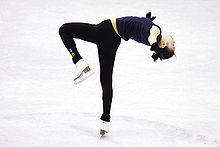Do Koreans want to support their athletes or not?

By Haemi Jung
South Korea, a small country in Asia, got 28 medals at London Olympic on 2012. This remarkable record on sports competition is one of elements representing South Korea. Also Pyeongchang wins the 2018 Olympic bid, that way; Korea becomes only the second Asian country to host the Winter Games. There was a world-famous athlete of Korea - Yuna Kim.
Yuna Kim is now one of the most famous figure skaters in the world. She won winter Olympic, and every time she plays, it is becoming issue that many broadcasts and newspapers are telling about her all over the world. She is an obviously walking-billboard representing South Korea. Emotional and passionate Korean people scream and cry for her win and establish fan-club supporting her. However, weak supporting from government and jealousy people seems putting her into difficult situations.
Compare to her long-time rival, Mao Asada, Yuna Kim is not supported enough. Yuna Kim was paying rent for practice at ice link filed until she entered Korea University at 2009. This year, she graduated and now she started to face the reality that she needs to pay every expense for her own play. TV advertisements are only her choices to overcome the economic situations. People easily blame Korean athletes on TV, because Korean people consider it as negligence of practices. On the other hand, Mao Asada is sponsored by more than 10 Japanese enterprises and applies sponsored money to the payment. Asada appears on TV shows off and on and her fans enjoy watching those shows. The treatment is completely different. Kim is not only one athlete who is in difficult economic situation. Tae hwan Park, a young swimming athlete spent 5 months without a sponsor, will attend an official ceremony at Incheon City Hall and join the Incheon City Hall swimming team finally. He lost his practicing pool, and showed up on Home-shopping program and met a big reaction.
Sponsors are not only problem. Short track skating is a one of the strongest sports, but there was an ugly situation 2 years ago. Hyunsoo Ahn, talented short track skater from none-major Sports University had issue with Korean Skating Union. He started to decline in 2006, however, after he spoke of chronic factionalism in Korean short track skating. Intense factional fighting had broken out between Korea National Sport University and other colleges, and certain athletes, including Ahn, had been rumored to have been deliberately left off the national squad. Russian national team persuaded him to join their team and play. Ahn dropped the Korean nationality and playing as a Russian athlete in Russian National Skating team. What does it mean? It shows South Korea just lost our talented player with open eyes. If South Korean people do not change the system of supporting nation's sports, we will get second Hyunsoo Ahn.
Does it really matter the privileges for athletes? The hottest issue about athletes' privilege is a military service problem, and it heats up the whole country. On 2002, people who were crying for becoming Semi-finalists of World cup cooled down so fast when they started to discuss about the exemption from military services. Recently, Cleveland Indians outfielder Choo Shin-soo helped the Korean team win a gold medal at the Guangzhou Asian Games in 2010 and avoided the military draft, and the situation was same. People (especially male) just turn their back when athletes escape from military services.
Rewarding athletes who were enhancing national prestige is necessary. It seems so wrong when people cheering them during the game and turn back showing duplicity when government or sponsors try to reward them in national scale. An athlete like Yuna Kim has no choice to help and raise her younger generation by herself, because there is no way to bringing-up. People's jealousy is killing young sports players in Korea.
Toward upcoming 2014 Sochi Winter Olympic, more systematic and heart-warming treatment for athletes is needed for becoming true-developed country which must start to be ready for 2018 Pyeongchang Winter Olympic after successful games on Sochi Winter Olympic.
Haemi Jung
Hankuk University of Foreign Languages
Subscribe to Pravda.Ru Telegram channel, Facebook, RSS!


